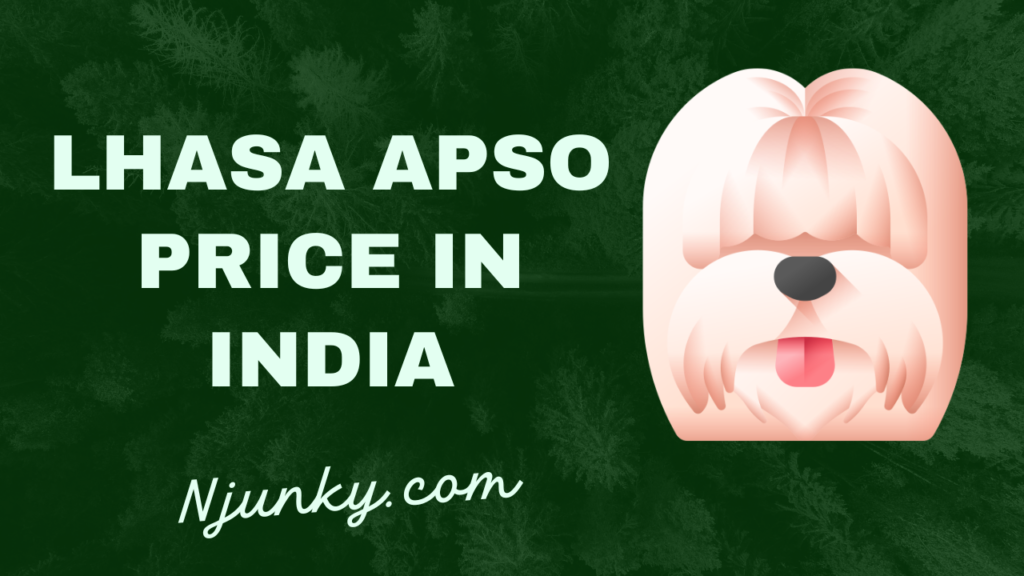The Lhasa Apso is a small and sturdy dog breed that has its origins in Tibet. Known for their long, flowing coat and charming personality, Lhasa Apsos have become a popular choice for dog lovers in India. However, as with any purebred dog, purchasing a Lhasa Apso comes with a price tag. In this article, we will explore the factors that influence the Lhasa Apso price in India, including their breed history, physical characteristics, and availability. Whether you are considering adding a Lhasa Apso to your family or are simply curious about the breed, this article will provide you with valuable information on the Lhasa Apsos price in India.
- Average Lhasa Apso Price In India
- Lhasa Apso Price range in different cities across India
- Color Variations in Lhasa Apso Dog
- Historical background of the Lhasa Apso breed
- Physical features and personality traits of Lhasa Apso
- Factors Affecting Lhasa Apso Price In India
- Other costs associated with owning a Lhasa Apso
- Tips for Buying a Lhasa Apso in India
- Health care and maintenance of Lhasa Apso
- Pros and cons of owning Lhasa Apso In India
- Final Thoughts
- FAQs
Average Lhasa Apso Price In India
The Lhasa Apso price in India can vary depending on several factors, including the location of the breeder, the lineage and quality of the dog, and the demand for the breed in that area. On average, a Lhasa Apso price in India can range from Rs. 15,000 to Rs. 40,000 or even higher. However, it is important to note that Lhasa Apso price in India should not be the only consideration when looking to adopt or purchase a Lhasa Apso.
It is essential to find a reputable breeder who provides proper care and attention to their dogs and can offer you healthy, well-socialized puppies. It is also important to consider the ongoing expenses associated with owning a dog, such as food, grooming, and medical care, before bringing a Lhasa Apso home.
Lhasa Apso Price range in different cities across India
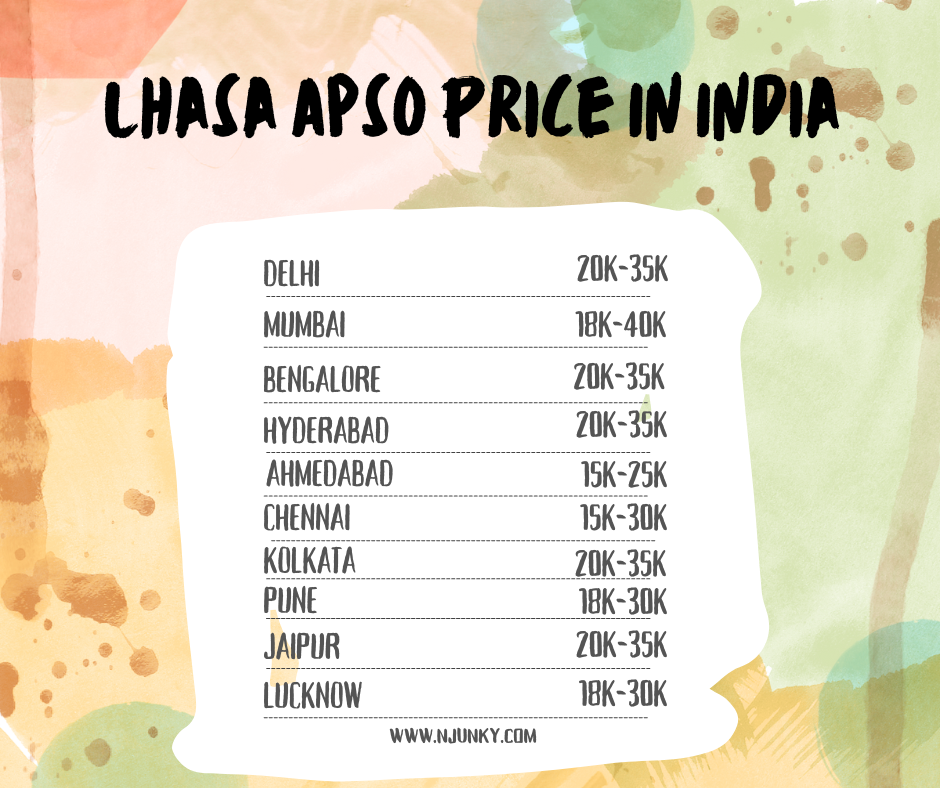
The Lhasa Apso is a small, toy breed known for its long, luxurious coat and charming personality. However, if you’re considering adding one of these furry friends to your family, it’s important to understand the cost associated with them. To help you make an informed decision, we’ve compiled a table detailing the price of Lhasa Apsos in 15 different cities across India.
| No | City | Price Range (in Rs.) |
| 1 | Lhasa Apso Price Delhi | 20,000 – 35,000 |
| 2 | Lhasa Apso Price In Mumbai | 18,000 – 40,000 |
| 3 | Lhasa Apso Price In Bangalore | 20,000 – 35,000 |
| 4 | Lhasa Apso Price In Chennai | 15,000 – 30,000 |
| 5 | Lhasa Apso Price Hyderabad | 20,000 – 35,000 |
| 6 | Lhasa Apso Price In Kolkata | 20,000 – 35,000 |
| 7 | Lhasa Apso Price In Pune | 18,000 – 30,000 |
| 8 | Lhasa Apso Price In Ahmedabad | 15,000 – 25,000 |
| 9 | Lhasa Apso Price In Surat | 18,000 – 28,000 |
| 10 | Lhasa Apso Price Jaipur | 20,000 – 35,000 |
| 11 | Lhasa Apso Price In Lucknow | 18,000 – 30,000 |
| 12 | Lhasa Apso Price In Kanpur | 18,000 – 30,000 |
| 13 | Lhasa Apso Price In Nagpur | 15,000 – 28,000 |
| 14 | Lhasa Apso Price In Patna | 18,000 – 30,000 |
| 15 | Lhasa Apso Price Bhopal | 18,000 – 30,000 |
Color Variations in Lhasa Apso Dog
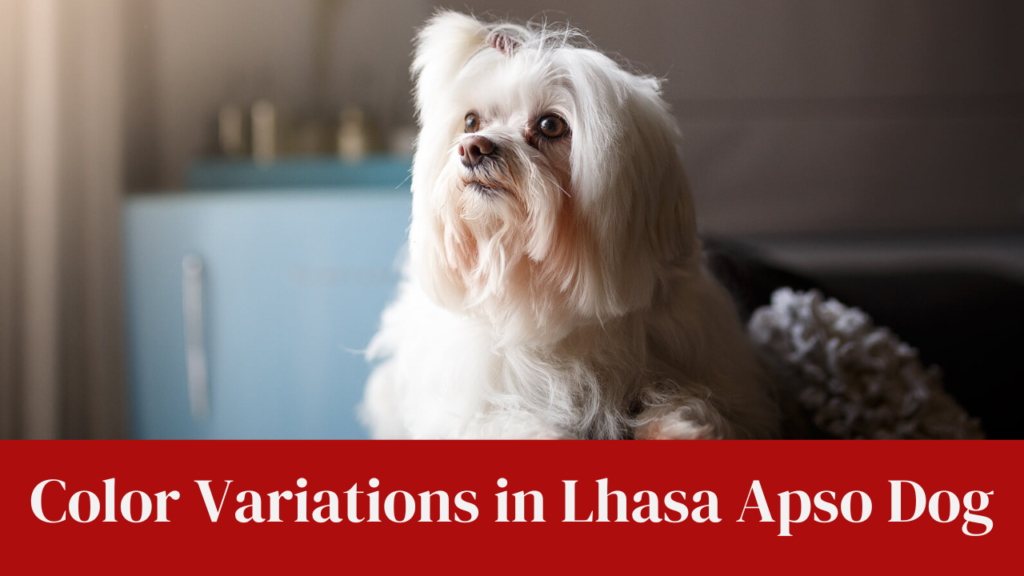
Lhasa Apsos come in various colors and color patterns. The American Kennel Club (AKC) recognizes several color variations for Lhasa Apsos. Here are some common color variations you may find in Lhasa Apsos:
Gold: This color ranges from light honey to deep golden shades. It’s a commonly seen color in Lhasa Apsos.
Cream: Cream-colored Lhasa Apsos have a lighter coat color that can range from pale ivory to creamy white.
Honey: This color is similar to gold but tends to have a slightly lighter and warmer tone. It can range from light honey to a deeper amber shade.
Black: Lhasa Apsos can have a solid black coat, which is usually deep and rich in color. Some black-coated Lhasa Apsos may have small amounts of white on their chest or feet.
White: While Lhasa Apsos are not predominantly white, some individuals can have predominantly white coats. However, it’s worth noting that the AKC standard prefers white markings to be minimal in show dogs.
Parti-Color: Parti-color refers to Lhasa Apsos with a combination of two or more colors. This can include a mix of black, white, gold, cream, or other colors. The distribution and arrangement of colors can vary widely among parti-color Lhasa Apsos.
Historical background of the Lhasa Apso breed
The Lhasa Apso is an ancient dog breed that originated in Tibet, specifically in the region surrounding the city of Lhasa. The breed’s history is deeply intertwined with Tibetan Buddhism and its monasteries. Lhasa Apsos were considered sacred dogs and were highly regarded as companions and watchdogs by Tibetan monks and nobility.
Here is a historical background of the Lhasa Apso breed:
Ancient Origins:
The Lhasa Apso is believed to be one of the oldest dog breeds in existence, with a history dating back over 2,000 years. They were bred and raised by Tibetan nobility, Buddhist monks, and other high-ranking individuals in Tibet.
Monastic Connection:
Lhasa Apsos were closely associated with Tibetan monasteries, particularly with the Dalai Lamas. It was believed that these dogs were the earthly manifestations of the Dalai Lamas’ guardian spirits. They were considered sacred and were often given as gifts to visiting dignitaries and important figures.
Purpose:
Lhasa Apsos served multiple purposes in their early history. They were primarily kept as companions and watchdogs in monasteries and palaces. Their acute hearing and alert nature made them excellent at alerting their owners to potential intruders or threats.
Isolation in Tibet:
Due to the breed’s isolation in Tibet, Lhasa Apsos remained relatively unknown outside the region for centuries. It wasn’t until the early 20th century that they were brought to the attention of the Western world.
Introduction to the West:
In the 1920s, British explorers and officers stationed in Tibet encountered the Lhasa Apso and were captivated by their unique appearance and temperament. They started bringing them back to Britain, leading to the breed’s introduction to the Western world.
Recognition and Breed Development:
The Lhasa Apso gained recognition from various kennel clubs in the mid-20th century. The breed standards were established to preserve the unique characteristics of the Lhasa Apso, including its long, dense coat, compact size, and lively yet dignified demeanor. Today, the Lhasa Apso is known and loved worldwide as a loyal companion dog and continues to showcase its ancient heritage and regal demeanor.
Physical features and personality traits of Lhasa Apso
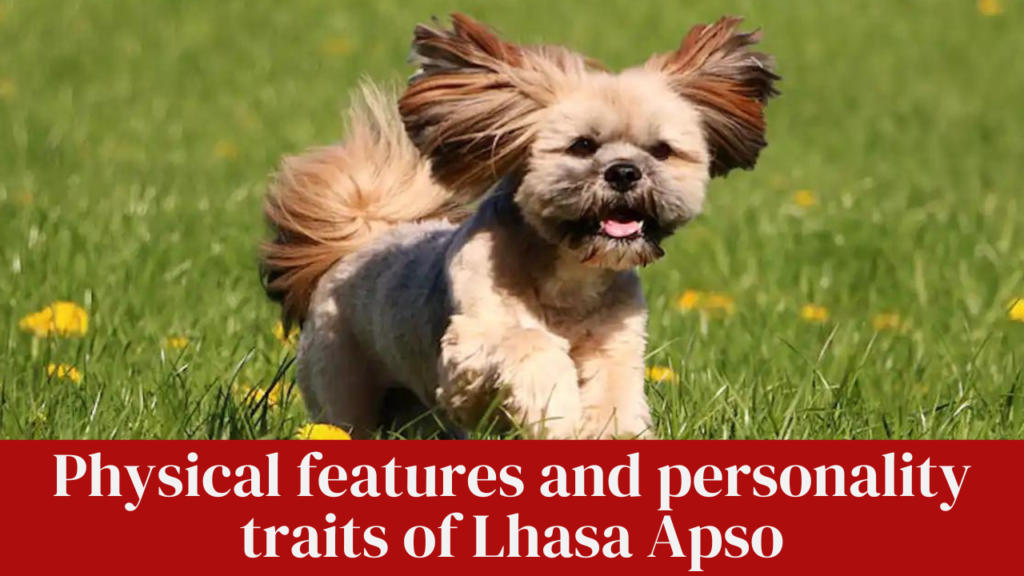
The Lhasa Apso is a small breed of dog that originates from Tibet. They are known for their long, luxurious coat and lion-like appearance. Their fur can be various colors, including black, white, brown or golden. Physical Features and personality traits of Lhasa Apso are discussed below
Physical Features:
The Lhasa Apso is a small dog breed with a long, flowing coat that can come in a variety of colors, including black, white, cream, and gold. They have a compact, sturdy build and a distinct lion-like appearance with their thick mane of hair and broad, square head. Lhasa Apsos typically stand between 10-11 inches (25-28 cm) at the shoulder and weigh between 12-18 pounds (5.4-8.2 kg).
Personality Traits:
Lhasa Apsos are known for their charming and affectionate personalities. They are highly devoted to their owners and often bond closely with one person in the household. They are also known for being independent and somewhat aloof with strangers, which makes them excellent watchdogs. Despite their small size, Lhasa Apsos have a big personality and can be quite assertive and stubborn.
They require firm and consistent training to prevent them from becoming too dominant. Overall, Lhasa Apsos make loyal and loving companions, but they are best suited for experienced dog owners who can handle their strong-willed nature.
Factors Affecting Lhasa Apso Price In India

Several factors can influence the price of Lhasa Apso dogs in India. Here are some common factors that can affect the Lhasa Apso price in India:
Breeder Reputation and Quality: The reputation and experience of the breeder play a significant role in determining the Lhasa Apso price in India. Reputable breeders who have a history of producing healthy, well-bred Lhasa Apsos with desirable traits and conforming to breed standards often charge higher prices for their puppies.
Pedigree and Bloodline: Lhasa Apsos with strong pedigrees, champion lineages, or dogs that have participated in dog shows or competitions may have higher price tags. The lineage and achievements of the parents can influence the Lhasa Apso price in India.
Health Screening and Vaccinations: Responsible breeders prioritize the health of their dogs and conduct health screenings for genetic disorders or common breed-related issues. Puppies that come with health clearances and up-to-date vaccinations may have a higher price due to the additional care and expenses incurred.
Coat Quality and Color: Lhasa Apsos with exceptional coat quality, such as a long, dense, and luxurious coat, or rare color variations, may be priced higher than those with average coats. Coat quality and color preferences can vary among buyers, which can impact the Lhasa Apso dog price in India.
Gender and Age: In some cases, gender and age can influence the Lhasa Apso price in India. For example, female Lhasa Apsos are often priced higher than males, particularly if they are intended for breeding purposes. Younger Lhasa Apso price in India may be higher than older ones.
Demand and Availability: Supply and demand dynamics in a specific location can impact the price of Lhasa Apsos. If the demand for Lhasa Apsos is high and the availability of puppies is limited, the Lhasa Apso price in India may be higher.
Geographic Location: Lhasa Apso price in India can also vary based on the region or city in India. Factors such as transportation costs and regional demand can influence the Lhasa Apso dog price in India.
You May Also Like
Other costs associated with owning a Lhasa Apso
In addition to the initial Lhasa Apso price in India, there are several other costs associated with owning a dog. Here are some of the common expenses you should be prepared for:
Food: The cost of feeding a Lhasa Apso can vary depending on the brand and quality of the dog food. On average, you can expect to spend around Rs. 4,000-8,000 per month on food for your Lhasa Apso.
Grooming: Lhasa Apsos have a long, flowing coat that requires regular grooming to keep it looking healthy and beautiful. This includes brushing, trimming, and bathing, which can cost anywhere from Rs. 500-2,000 per grooming session. Professional grooming services can cost even more.
Medical Care: Regular veterinary check-ups, vaccinations, and preventative medications such as flea and tick treatments are essential for maintaining your Lhasa Apso’s health. The cost of these services can vary depending on your location and the veterinary clinic you choose. You should budget at least Rs. 5,000-10,000 per year for medical expenses.
Training: Lhasa Apsos are intelligent and independent dogs that require early and ongoing training to develop good behavior and socialization skills. The cost of professional dog training can vary depending on the trainer and the type of training you choose. Expect to spend anywhere from Rs. 5,000-15,000 for a basic training program.
Supplies: You will need to purchase basic supplies such as a leash, collar, food and water bowls, and toys for your Lhasa Apso. These items can cost around Rs. 2,000-5,000 initially.
Tips for Buying a Lhasa Apso in India
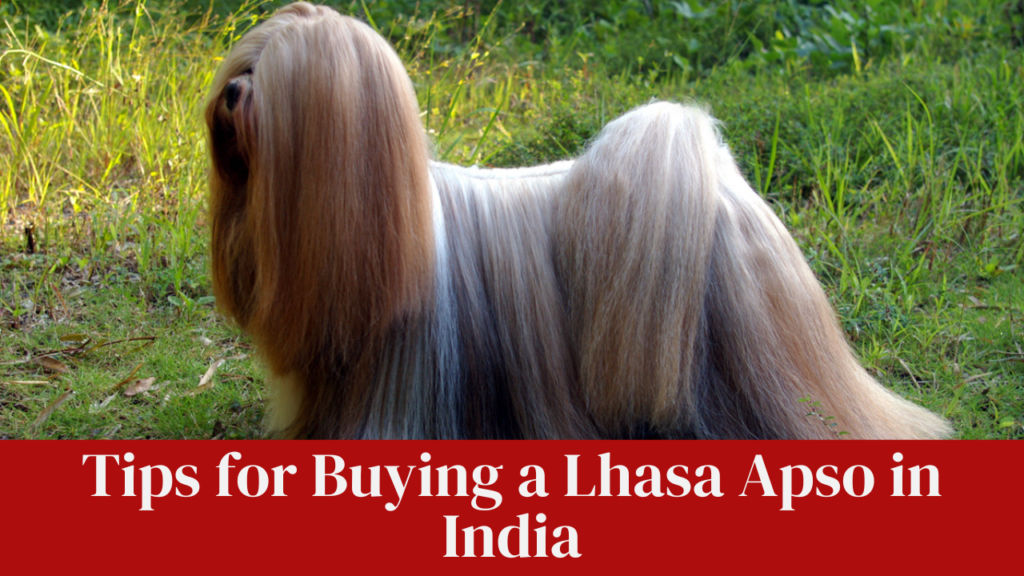
If you’re planning to buy a Lhasa Apso in India, here are some tips to help you find a healthy and well-bred puppy:
Research:
Take the time to research the Lhasa Apso breed, its characteristics, and care requirements. Understand the breed’s temperament, exercise needs, grooming needs, and potential health issues to ensure it aligns with your lifestyle.
Find a Reputable Breeder:
Look for a reputable breeder who has a good track record of breeding healthy Lhasa Apsos. A reputable breeder will prioritize the health and well-being of their dogs, conduct health screenings, and provide proper socialization for the puppies.
Visit the Breeder:
Visit the breeder’s facility or home to assess the living conditions of the dogs. Ensure that the dogs are well-cared for, clean, and have proper access to food, water, and exercise. Meeting the breeder in person also allows you to ask questions and observe the temperament of the adult dogs.
Health Checks:
Inquire about the health checks conducted on the parents and puppies. Responsible breeders will screen their breeding dogs for common genetic disorders and provide health clearances. Ask for relevant health certificates or documentation to verify the health of the puppy.
Puppy’s Socialization:
A well-socialized puppy is more likely to grow into a confident and well-behaved adult dog. Ask the breeder about the socialization efforts they have made with the puppies, such as exposure to different environments, people, and other animals.
Meet the Parents:
If possible, meet the puppy’s parents or at least the mother. Observing the parents’ temperament and behavior can give you an idea of how the puppy may turn out as an adult.
Contract and Documentation:
Ensure that the breeder provides you with a proper contract or agreement that outlines the responsibilities of both parties. It should include details about health guarantees, return policies, and any specific terms or conditions.
Visit with a Veterinarian:
Schedule a visit with a trusted veterinarian to have the puppy examined shortly after bringing them home. The vet can check for any underlying health issues and provide guidance on vaccinations, deworming, and ongoing healthcare.
Health care and maintenance of Lhasa Apso
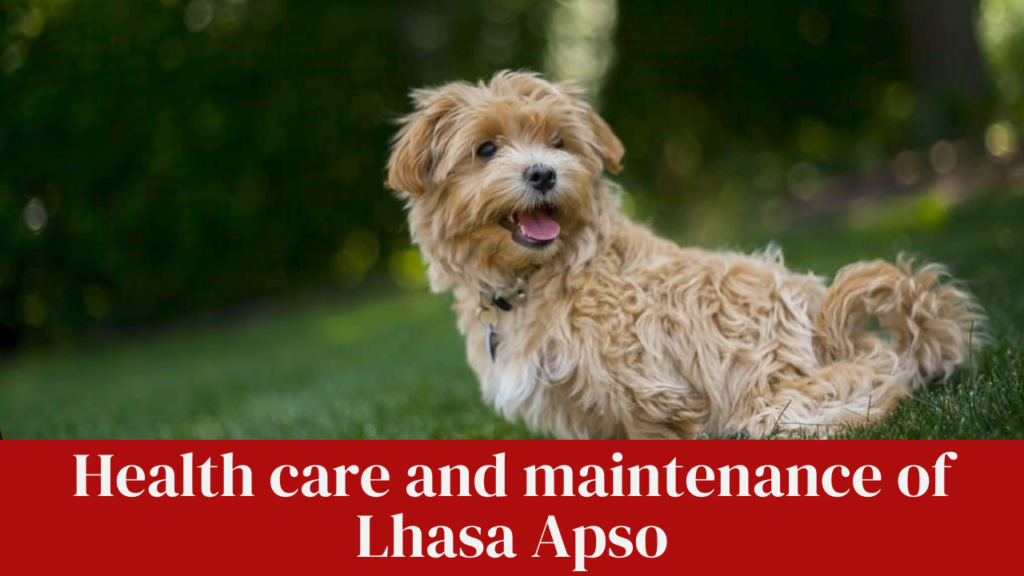
Lhasa Apsos are generally a healthy breed, but like all dogs, they require routine care and maintenance to ensure they remain happy and healthy throughout their lives. Here are some tips for caring for your Lhasa Apso’s health:
Grooming: Lhasa Apsos have a long, flowing coat that requires regular grooming to prevent matting, tangling, and skin irritation. Brush your Lhasa Apso’s coat daily to keep it healthy and shiny. Professional grooming every 6-8 weeks is also recommended.
Dental care: Good dental hygiene is important for your Lhasa Apso’s overall health. Brush their teeth regularly with a dog-specific toothbrush and toothpaste. Dental chews and toys can also help keep their teeth clean.
Exercise: Lhasa Apsos require regular exercise to maintain their physical and mental health. Aim for at least 30 minutes of exercise daily, such as a walk or playtime in a fenced yard.
Nutrition: Feeding your Lhasa Apso a balanced, high-quality diet is essential for their health. Choose a food that is appropriate for their age, weight, and activity level. Avoid overfeeding, which can lead to obesity and related health issues.
Vaccinations and preventative care: Regular veterinary check-ups are important for monitoring your Lhasa Apso’s health and catching any potential health issues early. Keep up with vaccinations and preventative care such as flea and tick prevention.
Environmental safety: Lhasa Apsos can be sensitive to extreme temperatures, so it’s important to keep them indoors during very hot or cold weather. Keep your home safe by removing any potential hazards such as toxic plants, small objects that can be swallowed, and dangerous chemicals.
Pros and cons of owning Lhasa Apso In India
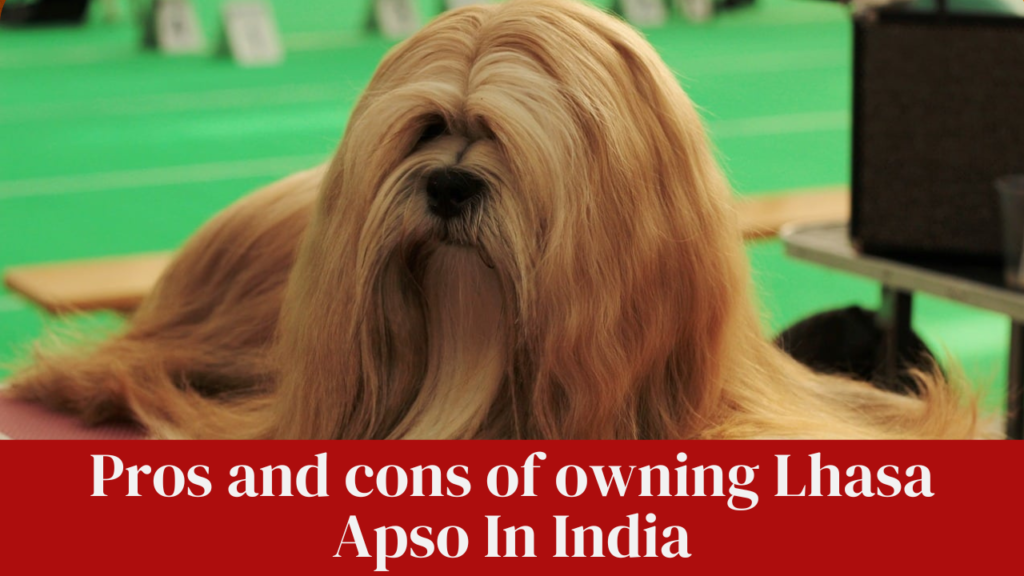
Owning a Lhasa Apso is a dream come true for many dog lovers in India. With their long, luscious hair and affectionate personalities, these dogs are highly sought after. However, as with any breed of dog, there are both pros and cons to consider before bringing one into your home.
Pros of Owning a Lhasa Apso in India:
- Size and Adaptability: Lhasa Apsos are small-sized dogs, making them suitable for apartment living or smaller homes. They can adapt well to various living environments, including cities or urban areas in India.
- Loyal and Protective: Lhasa Apsos are known for their loyalty and protective nature. They can be excellent watchdogs, alerting their owners to potential intruders or unusual situations.
- Longevity: Lhasa Apsos generally have a long lifespan, with an average life expectancy of 12-15 years. This allows for many years of companionship and enjoyment with your furry friend.
- Low Shedding: Lhasa Apsos have a non-shedding or minimal-shedding coat, which can be beneficial for individuals who are sensitive to pet dander or prefer to have a cleaner home environment.
- Companionship: Lhasa Apsos are known for their affectionate and loving nature. They can form strong bonds with their owners and provide companionship and emotional support.
Cons of Owning a Lhasa Apso in India:
- Grooming Requirements: Lhasa Apsos have a long, dense coat that requires regular grooming and maintenance to keep it clean and free of mats. This can be time-consuming and may involve additional grooming expenses.
- Health Issues: Lhasa Apsos may be prone to certain health problems, such as eye issues, allergies, hip dysplasia, and respiratory problems. It’s important to be aware of these potential health concerns and provide proper veterinary care.
- Training Challenges: Lhasa Apsos can be independent and stubborn at times, which can make training a bit challenging. Consistent and patient training methods, preferably with positive reinforcement, are necessary to ensure they develop good behavior.
Final Thoughts
In conclusion, owning a Lhasa Apso in India can be a rewarding experience for many individuals and families. These small-sized dogs are adaptable to various living environments, making them suitable for apartment living or smaller homes. They have moderate exercise needs and are known for their loyalty and protective nature, making them excellent companions and watchdogs.
The Lhasa Apso’s longevity and low-shedding coat are additional advantages, providing years of companionship without excessive shedding. Their affectionate and loving nature can bring joy and emotional support to their owners. However, it’s important to consider the grooming requirements of the Lhasa Apso’s long, dense coat, as it needs regular maintenance to keep it clean and mat-free.
Additionally, potential health issues and training challenges should be taken into account, as Lhasa Apsos may be prone to certain health problems and can exhibit independent and stubborn behavior. By finding a reputable breeder, providing proper veterinary care, and investing time and effort into training and socialization, the potential drawbacks of owning a Lhasa Apso can be managed effectively, allowing for a fulfilling and enjoyable companionship.
FAQs
Do Lhasa Apsos bark a lot?
Lhasa Apsos have a natural inclination to be alert and protective, so they may bark to alert their owners of potential intruders or unusual situations. Proper training and socialization can help minimize excessive barking and manage their vocal tendencies.
What are common health issues in Lhasa Apsos?
Lhasa Apsos may be prone to certain health issues, including eye problems (such as progressive retinal atrophy and dry eye), allergies, hip dysplasia, and respiratory issues. Regular veterinary check-ups, a balanced diet, and proper care can help manage and prevent these health concerns.
How active are Lhasa Apsos?
Lhasa Apsos have moderate exercise needs. They enjoy short walks, playtime, and mental stimulation. While they don’t require extensive exercise, they still benefit from regular activity to maintain their overall health and mental well-being.
Are Lhasa Apsos hypoallergenic?
While no dog is truly hypoallergenic, Lhasa Apsos are considered to be low-shedding dogs. Their minimal shedding and non-dander coat can be more tolerable for individuals with allergies. However, it’s always recommended to spend time with the breed to assess personal reactions before committing to ownership.
Are Lhasa Apsos good family pets?
Yes, Lhasa Apsos can make excellent family pets. They are known for their loyalty, affectionate nature, and adaptability. However, proper socialization and training are essential to ensure they get along well with children and other pets.
Are Lhasa Apsos expensive to maintain?
- Lhasa Apsos can be moderately expensive to maintain, as they require regular grooming, veterinary care, and high-quality food. However, the costs associated with owning a Lhasa Apso can vary depending on the individual dog’s needs and the owner’s lifestyle.
Is Shih Tzu and Lhasa Apso same?
While the Shih Tzu and Lhasa Apso share some similarities, they are different breeds of dogs. Both breeds have a long history in Tibet and were bred as companion dogs, but they have distinct differences in appearance and temperament.
The Shih Tzu has a slightly shorter, flatter face than the Lhasa Apso, and a slightly smaller and rounder head. They typically have a longer and thicker coat that can be more prone to matting and requires more grooming. Shih Tzus are known for their friendly, affectionate, and playful temperament.
The Lhasa Apso, on the other hand, has a slightly longer body and a more narrow, pointed muzzle than the Shih Tzu. They have a thick, double coat that can be more wavy than straight, and also require regular grooming. Lhasa Apsos are known for their independent, intelligent, and sometimes stubborn nature.
While both breeds make excellent companions and have similar origins, they have distinctive traits and characteristics that set them apart from one another.
Is Lhasa Apso an Indian breed?
No, Lhasa Apso is not an Indian breed. It is believed to have originated in Tibet, and it is named after the city of Lhasa, which is the traditional seat of the Dalai Lama. While Lhasa Apsos are not an Indian breed, they are popular in India and can be found throughout the country.

